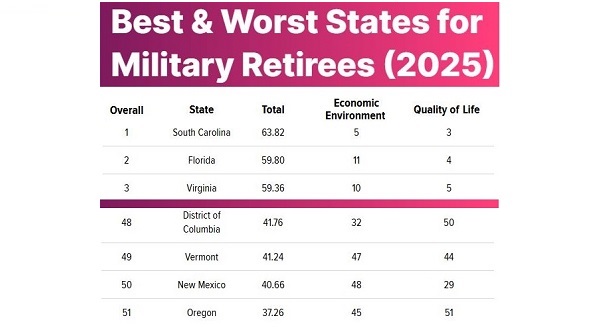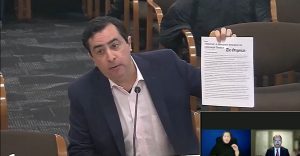Tax breaks could lift Oregon from worst in nation for supporting military retirees
4 min read
by Marty Wilde
Oregon ranks last in the country in support for military retirees. Though Oregon’s tax treatment of active service members is generally positive, with much active-duty pay and some reserve pay exempted from state income tax, those tax exemptions do not apply to retirement income.
Tax relief for military retirees is popular across party lines. However, the Oregon Legislature’s desire to reward military retirees for their service is tempered by the twin realities that a full tax exemption would be quite expensive and that the average military retiree does somewhat better than a civilian peer, economically.
The path of tax relief proposals through the Oregon State Legislature this session illustrates the challenges of passing even a bipartisan bill that might offer better support for veterans.
A look at two proposals: SB 519 and HB 2050
In our current legislative session, Senate Bill 519 and House Bill 2050 both exempt military retired pay from state income tax.
While both bills are technically still “alive,” it appears that HB 2050 has the greatest chance for passage, as it has had a public hearing featuring dozens of supportive testimonies, one neutral one, and none in opposition. The next stop for the bill is the House Revenue Committee.
The legislators involved in the process matter. Notable supporters of HB 2050 include Rep. Thuy Tran, the chair of the House policy committee, and Rep. Paul Evans, the former chair, who are both veterans and Democrats; and Rep. Werner Reschke, who is the vice chair of the House Revenue Committee and a Republican representing a district with a well-above-average 12% veteran population.
Unfortunately, Rep. Nancy Nathanson, who chairs the House Revenue Committee, has not taken a position on the legislation, and none of the Democrats on the committee are on record as being in support or are themselves veterans.
The bill could advance without passage through the House Revenue Committee, but only if the bill gets a majority vote on the floor, a rarely-successful procedural maneuver. (As a legislator, I tried it many times, none successful.)
If it passes the House, it likely faces a friendly reception in the Senate, where both the chair and vice chair of the Finance and Revenue Committee are veterans familiar with both the costs of any tax change and the benefits of attracting veterans to Oregon.
Reducing the cost from $38M to $8M
As a practical matter, the fate of a bill depends on its cost. The Revenue Committee chair gets marching orders from the speaker. Those orders always contain limits on how much the committee can “give away” in tax credits or deductions. While offsetting the cost with new revenue is a possibility, the bill does not contain any revenue-raising provisions. To pass the bill, the House Revenue Committee will have to reduce the cost.
Fortunately, scaling the benefit can reduce the cost in equitable ways. First, Oregon has roughly 21,000 military retirees who receive an average of about $30,000 annually and the average effective income tax rate in Oregon is 6% after deductions and credits. That gives a revenue impact of roughly $38 million if the bill passes as drafted and all military retired pay becomes tax-exempt.
One option to provide the most benefit to the lowest-income retirees would be to extend the existing $6,000 active military pay deduction to retired military pay. This results in a revenue hit of only about $8 million.
Taking a different approach, keeping the full deduction but tying it to a service-connected disability, would result in a revenue reduction of about $11.5 million. The Legislature could also choose to phase out the deduction at a particular income level, although the revenue implications are more difficult to calculate.
Reducing the income tax burden for military retirees is only one of the proposals to make Oregon friendlier to military retirees. Several other bipartisan proposals aim to reduce property taxes for disabled veterans, provide free tuition to their family members, assist veterans with medical care, and improve Oregon’s veteran dental program.
Veterans make good neighbors
Military retirees are generally admired for the positive traits resulting from their years of service and often have many working years left when they leave the service, making attractive residents after their military service.
Veterans have some unusual characteristics compared to other retirees. Most serve 20 to 30 years in the military, some entirely on active duty, some entirely in reserve status, and many with a combination of both.
Their retirement includes both a pension and an account similar to a 401(k) plan. Active-duty retirees may receive a non-disability retirement pension as young as age 37 (if they joined at 17), while those who served in the reserves generally start receiving a lower pension between ages 50 and 60.
About 30% of military retirees have a rated disability with the Veterans Administration, making them eligible for VA health care and often a disability payment to offset their lower earning capacity.
Unsurprisingly, disabled veterans of working age tend to have lower civilian pay than their non-disabled peers. Most of these will receive a tax-free benefit to compensate them for those disabilities, as well as health care from the VA.
Retirement-age military retirees generally have higher income than their civilian peers, but over 150,000 veterans make less than $20,000/year in retirement.
Active-duty military members relocate frequently during their careers, and when they retire, they have an unusually high rate of relocation.
Having experienced the conditions and opportunities in many areas of the country, they are savvy shoppers for a new community home. In retirement, economic concerns can be paramount in decision-making, making Oregon’s high income and property taxes a significant concern.
It’s good to see there are still areas where the parties can find agreement. Veterans make good neighbors, and Oregon will benefit in many ways by becoming more attractive to military retirees.
Marty Wilde represented central Lane and Linn counties in the Oregon legislature. For more of his Letters From a Recovering Politician, subscribe at https://martywilde.substack.com/subscribe.






